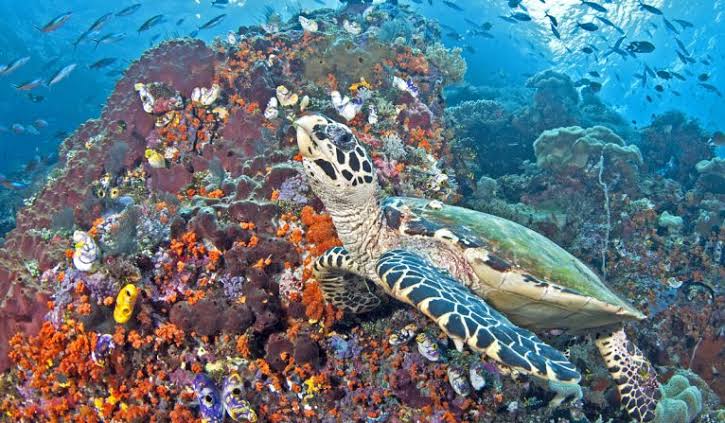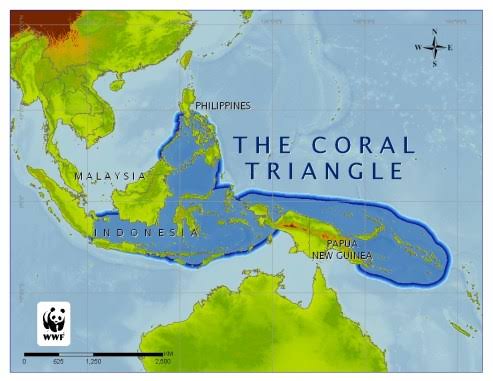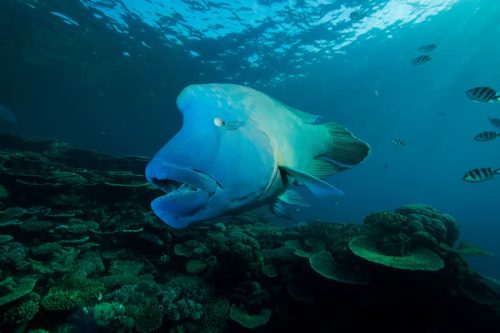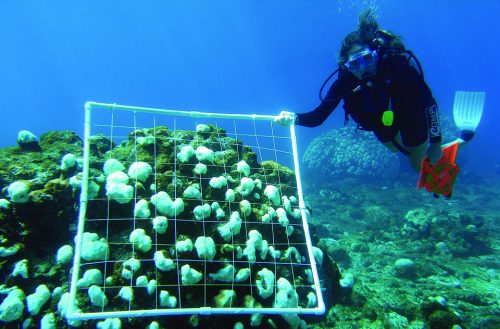The Coral Triangle Initiative: Preserving our Marine Heritage for the Future

The hawksbill sea turtle in the coral triangle (Photo Credit : Jayne Jenkins/Catlin Seaview Survey)
The Coral Triangle region, which is also known as the "Amazon of the Seas," is a vast marine area spanning the waters of Indonesia, Malaysia, the Philippines, Papua New Guinea, Timor-Leste, and the Solomon Islands. Covering an area of approximately 6 million square kilometers, this region is renowned for its extraordinary marine biodiversity, serving as home to more than 600 species of reef-building corals and 2,000 species of coral reef fish.

Coral triangle (Photo Credit : WWF Singapore Blog)
The unique significance of the Coral Triangle lies in its vital contribution to the global marine ecosystem balance. The coral reefs within this region serve as critical habitats for a multitude of marine species, including commercially valuable fish stocks. Beyond their ecological importance, the coral reefs also play a crucial role in protecting coastlines from erosion and storms, as well as providing livelihoods for millions of people living in the surrounding areas.
Ecologically, the Coral Triangle region is an exceptionally productive fishing ground, with local communities heavily dependent on the marine resources for their sustenance through fishing, marine tourism, and other ocean-based economic activities. The health of the coral reefs directly impacts the economic and social well-being of these communities.
However, the Coral Triangle is currently facing a range of serious threats, including climate change, pollution, overfishing, and destructive fishing practices. These threats not only degrade the coral reef ecosystems but also jeopardize the long-term sustainability of the economic and social systems that rely on this vital resource.
In recognition of the critical importance of the Coral Triangle, the Coral Triangle Initiative (CTI) was established in 2009 as a multilateral effort to manage and conserve the region's marine and coastal resources. Led by the six countries of Indonesia, Malaysia, Papua New Guinea, the Philippines, the Solomon Islands, and Timor-Leste, the CTI aims to address the challenges facing the Coral Triangle through the implementation of a comprehensive action plan focused on coral reef management, fisheries, and food security.
The Goals
The Coral Triangle Initiative has these five main goals designed to manage and conserve the marine and coastal resources within the Coral Triangle region.
- Stabilizing and/or Maintaining Coral Reef Ecosystem Integrity and Services: Stabilizing and/or maintaining the integrity and services of coral reef ecosystems.
- Improving and Sustaining Fish Stocks: Improving and sustaining sustainable fish stocks.
- Improving the Affordability, Availability, Quality, and Safety of Food Coming from Coastal and Marine Environments: Improving the availability, quality, and safety of food originating from coastal and marine environments.
- Improving Climate Change Adaptation Measures: Improving climate change adaptation efforts.
- Improving Threatened Species Status: Improving the status of threatened species.
Biodiversity in the Coral Triangle
The Coral Triangle region is home to an astounding diversity of marine life. This area encompasses more than 600 species of reef-building corals, which form the very foundation of the underwater ecosystems. These corals not only create the physical structure of the reefs, but also provide habitat and shelter for thousands of other species.
Beyond the captivating corals, the Coral Triangle is a stronghold for approximately 2,000 species of reef fishes, including economically and ecologically important species like the iconic Napoleon wrasse (Cheilinus undulatus) and a vast array of ornamental reef fish that are prized in the global aquarium trade.

Napoleon wrasse (Photo Credit : David Doubilet)
The region's remarkable biodiversity extends far beyond just the fish. Sea turtles, whales, dolphins, and dugongs also call the Coral Triangle home. Green turtles (Chelonia mydas) and hawksbill turtles (Eretmochelys imbricata) frequently use the reefs as foraging grounds and nesting sites. The presence of these charismatic marine mammals further underscores the Coral Triangle's status as a global epicenter of marine life.
However, the Coral Triangle's biological richness is not limited to just the coral reefs. This region also encompasses interconnected mangrove forests, seagrass beds, and estuaries - all of which play vital roles in supporting the overall marine ecosystem. Mangrove forests, for instance, serve as crucial breeding and nursery grounds for many fish and crustacean species. Seagrass beds provide essential habitat for dugongs and numerous other marine organisms.
The Coral Triangle's extraordinary biodiversity holds immense ecological, economic, and social value. Marine-based tourism, such as scuba diving and snorkeling, provides significant income for local communities. Additionally, many people in the region depend on traditional, sustainable fisheries as a source of food and livelihood.
Challenges and Opportunities Ahead
The conservation of coral reefs in the Coral Triangle region faces various complex challenges. One of the main challenges is climate change, which causes global warming and an increase in sea temperature. Higher temperatures can trigger coral bleaching, which significantly threatens the survival of coral reef ecosystems. Additionally, the increasing acidity of the oceans due to the absorption of carbon dioxide also damages coral structure and inhibits their growth.

A scuba diver surveys bleached corals (Photo Credit : NOAA)
Marine pollution is another serious challenge. Plastic waste, toxic chemicals, and land-based pollution threaten the health of coral reef ecosystems. This pollution not only directly damages the coral reefs but also disrupts the life of species that depend on these ecosystems.
Overfishing and unsustainable fishing practices, such as the use of bombs and poisons, cause physical damage to coral reefs and reduce the populations of fish that are essential for the balance of the ecosystem. In addition, uncontrolled coastal development also threatens the sustainability of coral reefs through habitat destruction and increased sedimentation.
Although the challenges faced are quite significant, there are various opportunities and innovations that can support the conservation of coral reefs in the future. One of the main opportunities is the increase in awareness and international cooperation in conservation efforts. Global programs such as the Coral Triangle Initiative (CTI) play an important role in facilitating cooperation among member countries to address common threats and preserve coral reefs.
Technological innovations also offer new hope for conservation efforts. For example, satellite-based mapping and monitoring technologies enable real-time monitoring of coral reef conditions, allowing for more rapid and targeted rescue actions. Coral restoration technologies, such as coral farming and transplantation, are also beginning to show promising results in efforts to repair damaged coral reefs.
Community-based approaches and sustainable marine resource management are also crucial keys in addressing these challenges. Involving local communities in conservation efforts through training and empowerment can improve the effectiveness and sustainability of conservation programs.
The Role of the Community and Education in Coral Reef Conservation
Community awareness and participation are crucial for the conservation of coral reefs. Without the support and active involvement of the community, conservation efforts will not succeed. Therefore, effective education and outreach programs are necessary to raise public awareness about the importance of coral reefs and the threats they face.
Environmental education can begin at an early age in schools, with curricula teaching about marine ecosystems, biodiversity, and the importance of conservation. In addition, outreach programs for coastal communities can be conducted through workshops, seminars, and environmental campaigns. Social media and digital platforms can also be utilized to disseminate information and inspire positive action.
Collaboration between the government, non-governmental organizations, academics, and the private sector is also essential in developing and supporting education and outreach programs. By working together, various stakeholders can create a greater impact and achieve more effective conservation goals.
Through awareness, active participation, and innovation, we can address the challenges of coral reef conservation and create a better future for this remarkable marine ecosystem. Coral reefs are a precious natural heritage, and preserving their sustainability is a shared responsibility.
Thus, the CTI (Coral Triangle Initiative) focuses on the sustainable management and conservation of marine and coastal resources, as well as enhancing the capacity of coastal communities to adapt to climate change and improve their quality of life.
References
https://www.thegef.org/newsroom/news/coral-triangle-initiative-coral-reefs-cti-fisheries-and-food-security
https://sdgs.un.org/partnerships/coral-triangle-initiative-coral-reefs-fisheries-and-food-security-cti-cff
https://www.conservation.org/projects/coral-triangle-initiative
https://www.coraltriangleinitiative.org/about

